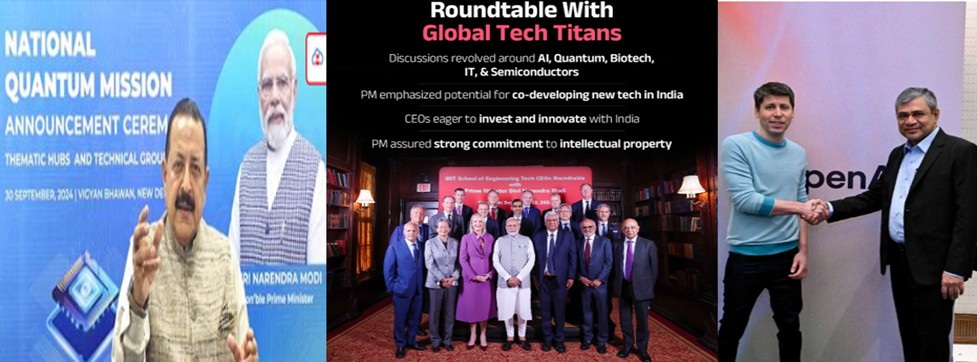India is embarking on an ambitious journey toward technological self-reliance and global leadership with the launch of its IndiaAI Mission and National Quantum Mission (NQM). The Union Budget 2025 has allocated ₹2,000 crores for AI development and ₹6,003.65 crores for quantum computing research, underscoring India’s commitment to building a robust digital economy driven by cutting-edge AI and quantum technologies. These initiatives aim to ensure affordability, security, and efficiency while democratizing AI access and fostering quantum research. However, for India to truly realize the potential of these technologies, effective implementation, strong industry-academic partnerships, and a skilled workforce will be crucial.
IndiaAI Mission- Making AI Affordable and Secure by Democratizing AI Access
Bridging the Cost Barrier: One of the key aspects of the IndiaAI Mission is its focus on affordability. Unlike global AI models that charge $2.5–$3 per hour for computation, India’s indigenous AI model will cost less than ₹100 per hour, benefiting from a 40% government subsidy. This ensures that AI is accessible to startups, researchers, and businesses, fostering widespread innovation.
Supercomputing Infrastructure for AI Growth: India is rapidly scaling its computational capacity to support AI advancements. With an initial setup of 10,000 GPUs (Graphics Processing Units), this computing facility is set to expand to 18,693 GPUs. This makes it one of the most powerful AI infrastructures globally, rivaling major AI ecosystems like DeepSeek and ChatGPT. This high-performance computing infrastructure will support the development of multiple foundational AI models in Indian languages, catering to agriculture, healthcare, education, and climate change applications.
Ensuring Responsible AI Development: India seeks to balance AI innovation with ethical safeguards, reinforcing global trust in India’s AI ecosystem. Recognizing the ethical risks associated with AI, the government has established an AI Safety Institute focused on:
- AI Bias Mitigation Strategies – Ensuring fairness and inclusivity in AI models.
- Machine Unlearning – Enhancing AI models’ ability to forget biased or sensitive information.
- Explainable AI Frameworks – Making AI decisions more transparent.
- Deepfake Detection Tools – Combating AI-generated misinformation.
Empowering AI Research through Cloud Services: To accelerate AI research and application development, the government has introduced an AI cloud initiative with ₹10,372 crores in funding. This initiative aims to bridge AI infrastructure gaps and provide cloud-based AI services to startups, MSMEs, academia, and research institutions.
Quantum Computing- India’s Leap into the Next Frontier
Quantum computing is no longer just a theoretical concept—it is fast becoming a reality with potential applications in cryptography, pharmaceuticals, and materials science. India’s ₹600 crore investment in the National Quantum Mission (NQM) is a strategic step toward securing its place in this high-stakes global race.
Advancing High-Efficiency Computing to address Energy Crisis in AI Computation: While AI has transformed industries, it comes with a major challenge – energy consumption. AI computation demands are doubling every three to four months, far exceeding Moore’s Law. If this trend continues, computing energy consumption could surpass global energy production in the coming decades. Quantum computing presents a sustainable solution to this problem. Unlike classical computers that rely on binary processing, quantum computers leverage superposition and entanglement, allowing them to perform complex calculations with significantly lower energy consumption.
The NQM Roadmap: To accelerate research and development, the government will establish four Thematic Hubs (T-Hubs) in leading academic and R&D institutions. The National Quantum Mission (NQM), backed by ₹6,003.65 crores, aims to:
- Develop 50–1,000 qubit quantum computers over the next eight years.
- Establish secure quantum communication networks over 2,000 km.
- Advance quantum metrology and sensing applications.
- Foster quantum material research for superconductors and novel semiconductor structures.
Integrating Quantum Computing with AI: Quantum computing will complement AI by enabling quantum-enhanced algorithms for:
- Cybersecurity & Cryptography – Developing unbreakable encryption techniques.
- Pharmaceutical Research – Accelerating drug discovery and molecular analysis.
- Large-Scale Data Processing – Enhancing AI’s ability to process vast datasets efficiently.
Challenges and Strategic Imperatives for Building India’s AI & Quantum Future
India stands at the cusp of a technological revolution, with artificial intelligence (AI) and quantum computing poised to redefine industries. To remain competitive, we must prioritize four key areas: workforce development, infrastructure investments, public-private collaboration, and regulatory frameworks. First, integrating AI and quantum computing into STEM curricula at leading universities is crucial. Public-private partnerships should spearhead upskilling initiatives, ensuring that India’s talent pool remains globally competitive. Additionally, government-backed quantum fellowships can attract top researchers, fostering innovation.
Second, infrastructure investments must be a national priority. Quantum research labs and AI supercomputing hubs require sustained funding, while indigenous quantum chip fabrication capabilities must be developed to reduce reliance on foreign technology. Expanding high-performance computing (HPC) clusters is essential to AI growth.
Third, Research and development can be accelerated through cooperation with international tech behemoths like Google, IBM, OpenAI, and Microsoft as well as Indian and international academic institutions or research organizations such as DRDO, ISRO, MIT, Argonne National Laboratory, and IITs. At the same time, incentivizing Indian startups and enterprises in AI and quantum computing will strengthen domestic innovation. Finally, regulatory frameworks must evolve to ensure ethical AI governance, strengthen data privacy protections, and develop quantum security measures to safeguard against future cyber threats. With strategic investment and policy action, India can emerge as a global leader in AI and quantum computing. The time to act is now.
Conclusion: Positioning India as a Global AI and Quantum Leader
The Union Budget 2025 lays a transformative roadmap for India’s AI and quantum computing future. By focusing on affordability, security, and indigenous innovation, India is poised to become a global technology leader. However, funding alone is not enough. The next phase must focus on strategic execution, industry-academic collaborations, and sustained investment in R&D and talent development. With AI and quantum computing driving India’s digital transformation, the country is on course to becoming a world leader in emerging technologies. The journey has begun—India must now accelerate its momentum to lead the next wave of innovation.
(The views expressed are the author's own and do not necessarily reflect the position of the organisation)


